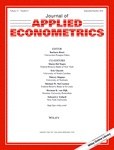
Muller, P., \van der Klaauw\, B. and Heyma, A. (2020). Comparing econometric methods to empirically evaluate activation programs for job seekers Journal of Applied Econometrics, 35(5):526--547.
-
Affiliated authors
-
Publication year2020
-
JournalJournal of Applied Econometrics
We test whether different identification strategies give similar results when evaluating activation programs. Budgetary problems at the Dutch unemployment insurance (UI) administration in March 2010 caused a sharp drop in the availability of these programs. Using administrative data provided by the UI administration, we evaluate the effect of the program (1) exploiting the policy discontinuity as a quasi-experiment, (2) using dynamic matching assuming conditional independence, and (3) applying the timing-of-events model. All three strategies use the same data to consider the same program in the same setting, and show that the program reduces job finding directly after enrollment. However, the magnitude of the estimated drop in job finding differs between the three estimation methods. In the longer run, all three methods show a zero effect on employment.